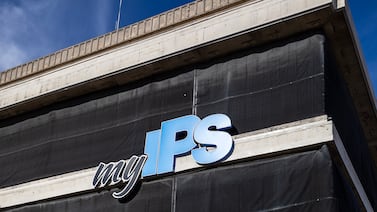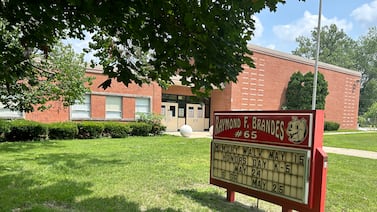Sign up for Chalkbeat Philadelphia’s free newsletter to keep up with news on the city’s public school system.
Philadelphia’s new $6.8 billion city budget does little to help what many call the city’s chronically underfunded school district close its looming deficits — and public education advocates say the city could have done more.
The final budget — which reflects a deal between Mayor Cherelle Parker and City Council leadership — passed 15-1 on Thursday. It includes some significant wage and business tax cuts as well as Parker’s signature housing initiative, but it does not deliver a meaningful funding increase to the school district.
By not adding new money for the school district, “this budget sets up our schools for major cuts in the coming years,” Councilmember Kendra Brooks said. Brooks was the lone no vote on the budget.
The final budget looks nearly identical to what Parker originally proposed for schools in March. It increases Center City parking fees, which Parker’s office says would add $4 million to district coffers. And it will increase the school district’s share of the city’s property tax revenue from 56% to 56.5% in fiscal 2030. Parker’s office estimates that shift will mean $12 million in new funding to the district, albeit all at once five years from now.
It also includes $500,000 to “fully cover the credentialing costs for current Career and Technical Education teachers” employed by the district, according to a statement from Majority Leader Katherine Gilmore Richardson.
But the district is grappling with a growing annual deficit that is slated to reach $466 million in 2027 and $774 million in 2030. And while Gov. Josh Shapiro’s proposed budget would send some $160 million more to Philly schools in fiscal 2026, it’s unclear whether schools will get that increase.
The school district’s budget is $4.6 billion.
For fiscal year 2026, the district is planning to use 40% of its “rainy day” fund to cover a $306 million budget hole, which district leaders say is the result of decades of unconstitutional underfunding by the state.
Donna Cooper of the education advocacy group Children First told Chalkbeat that given the size of the city’s funding surplus, it could have easily afforded to change the district’s share of property taxes this year rather than waiting until 2030. She added that the City Council should have demanded the change take place sooner.
Last year, the city increased the district’s share from 55% to 56%, which Parker’s office said added $24 million for the city’s schools. Parker has said she would like to gradually shift the district’s share of property taxes to 58% over time.
“It makes absolutely no sense to me,” Cooper said. “I personally cannot conjure up the logic that would enable people to argue that there’s not enough money to do it this year, and certainly no reason to even say it should wait till 2030.”
Cooper said because Philly is the only school district in the state that cannot raise its own tax revenue, it’s at a political disadvantage during budget negotiations. Of the district’s budget, $2 billion comes from the city, $2.4 billion from the state, and nearly $180 million from the federal government, although President Donald Trump has proposed cutting some federal education spending.
“We really need Council to unite behind the cause of the school district, because it is the obligation for them to do it,” Cooper said.
Asked why the City Council did not significantly increase school funding this year, Council President Kenyatta Johnson cited “the uncertainty” of potential cuts coming from the Trump administration.
“As we move forward, we’ll look at the school district’s finances and how they are operating,” Johnson said. “If we have to make adjustments to make further decisions financially to support the school district we’ll evaluate that in the future.”
Early on in the budget negotiation process, Councilmember Isaiah Thomas, who chairs the education committee, said he was mulling the possibility of putting that property tax shift in this fiscal 2026 budget. But the proposal did not survive the negotiation process.
While the city waits for state lawmakers “to develop a fair funding formula to equitably and properly fund our schools, we in Philly have to find more creative and immediate ways to invest in our students, teachers, and everyone who makes Philly schools excellent,” Thomas said in an email.
Brooks said “multiple Councilmembers and parents across Black and brown neighborhoods advocated” for an increase in the property tax revenue that goes to the district “in order to boost public school funding,” but were unsuccessful.
Carly Sitrin is the bureau chief for Chalkbeat Philadelphia. Contact Carly at csitrin@chalkbeat.org.






